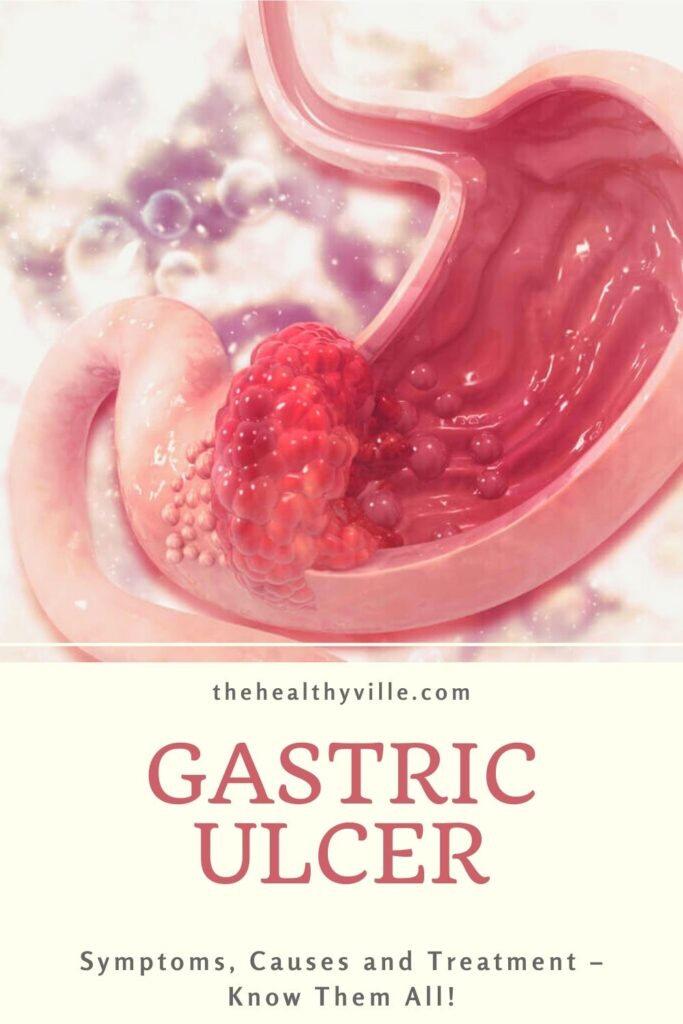Gastric ulcer symptoms vary, and this frequent condition can greatly affect the life of the one who suffers from it. Learn all about it!
The excess of gastric acids that some people suffer makes them more prone to developing gastric ulcers. That is, they occur when the lining of the stomach or duodenum is damaged. Therefore, a gastric ulcer is a wound or sore in the lining of the stomach or duodenum. However, it could appear in the esophagus and even in later sections of the small intestine.
Most ulcers occur in the first layer of lining that covers the affected organ. Sometimes they are so large that they pierce the stomach. If this were to happen, the patient’s life would be in danger. Hence, it must be addressed with the utmost urgency.
Hence, it is essential to know this disorder. This way we will be in better conditions to prevent it.
Causes of gastric ulcer
There are two situations that cause the appearance of gastric ulcer:
- Excess hydrochloric acid secreted by the stomach.
- The weakening of the mucous membranes that cover and protect its wall.
These two factors are due to different causes. The most common causative agent is Helicobacter pylori. Two thirds of the world’s population have this bacteria in their digestive system. It is not known how it is transmitted. However, there are indications that point to contaminated water and food as a possible source of infection.
Another cause of gastric ulcer is the continued and abusive use of anti-inflammatories. Among those drugs is ibuprofen. On the other hand, excessive consumption of alcohol and tobacco undoubtedly increases the risk of suffering from this disease.
Likewise, it should be clarified that factors such as stress and the consumption of spicy foods do not cause gastric ulcers. Only one caveat could be made: they could make it worse.
Gastric ulcer symptoms
The most common gastric ulcer symptoms are the following:
- Burning sensation.
- Fatty food intolerance.
- Bleeding or hemorrhage.
- Vomiting after meals.
- Nausea and belching more frequent than normal.
- Feeling of fullness or a full stomach.
Abdominal pain. The contact of the excessive production of stomach acids with the digestive mucosa generates pain that usually worsens after meals.
Diagnosis
To diagnose this type of pathology, the doctor usually asks a series of questions about the pain that the patient experiences. A palpation is performed on the epigastric area, the place where severe pain appears in this type of ulcer. When it is necessary to go deeper, blood samples are analyzed and ultrasound scans are performed to confirm the diagnosis.
Gastroscopy is the most effective method of determining what type of gastric ulcer it is and its severity. With this test, small samples of the damaged tissue are usually taken and analyzed in the laboratory to determine which pathogen may be causing it.
Thanks to gastroscopy it is possible to diagnose when it is a simple gastritis, a gastric ulcer or cancer
Treatment
The treatment for gastric ulcer basically consists of administering medications that reduce the production of gastric acids. Also, in the supply of antibiotics to eliminate the Helicobacter pylori bacteria. In any case, changes in diet are essential to comprehensively treat this pathology.
Many people take baking soda as a remedy to alleviate excess acidity. However, this long-term habit alters the production of gastric juices, which leads the patient to suffer serious digestive diseases.
Nutritional tips
People with gastric ulcers or who are predisposed to suffer from this disease, should reduce or eliminate the consumption of these foods:
- Tea and coffee.
- Sugar and sweets.
- Acidic foods.
- Fizzy drinks.
- Red meat and sausages.
- Fried and precooked foods.
- Very spicy or spicy foods.
- Refined flours (pastries, baked goods, pizzas, etc.).
Instead, including these foods into your diet can be very beneficial:
- Cabbage.
- Pineapple.
- Celery.
- Cucumber.
- Aloe Vera.
- Apple.
- Pepper.
- Berries.
- Potato or sweet potato.
- Carrot juice.
A matter of habits
To facilitate the complete healing of a gastric ulcer, it is very important to suppress bad habits that stimulate the secretion of gastric acids, such as the consumption of tobacco, alcoholic beverages and excessive consumption of coffee.
On the other hand, there are some habits that could help us prevent this pathology and that are very easy to incorporate into the routine:
- Chew each food well.
- Eat light meals early.
- Avoid eating in nervous situations.
- Do not wear tight clothing that oppresses the abdomen.
- Eat several small meals throughout the day.
- Drink water throughout the day and always outside of meals.
So, if you have any doubts, the ideal is to resolve them with the attending physician. Either in consultation or by phone. Likewise, it is essential to avoid taking measures without first consulting with the professional, because although many seem innocuous, they could be counterproductive in some cases.
Don’t forget to SHARE everything about gastric ulcer symptoms, causes and treatment with your friends and family on your social networks!

